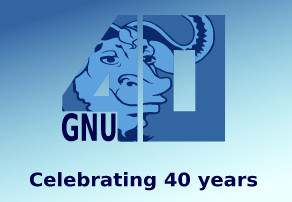The GNU project celebrates its 40th anniversary


The 40th Anniversary of GNU, by the Free Software Foundation (FSF)
On September 27, the Free Software Foundation (FSF) will celebrate the 40th anniversary of the GNU operating system project and the free software movement. To celebrate this milestone date, the FSF announces a hacker meeting in Switzerland, in Biel, this Wednesday, September 27th, and a “hackday” day for families, students and anyone interested in this anniversary, at its headquarters in Boston, Massachusetts, on Sunday, October 1st.
A message in a Usenet forum
The Swiss meeting will be attended in particular by the founder, Richard Stallman, Sébastien Blin, of GNU Jami (free audio and video telephony software), winner in 2022 of the Free Software Award for Projects of Social Benefit, Matthias Kirchner, President of FSF Europe, and several webmasters.
On September 27, 1983, an American computer scientist, Richard Stallman, announces his project to develop an operating system analogous to Unix, called GNU – a recursive acronym, for “GNU’s not Unix”. A statement in a Usenet discussion forum, net.unix-wizards, titled “New Unix Implementation”, which begins like this:
“As of next Thanksgiving, I will start writing a complete, Unix-compatible software system called GNU (for GNU is not Unix), and distribute it freely to everyone who wants to use it. I am appealing for any contribution in time, money, programs and materials to advance this project.»
(For more details on these beginnings, see the chapter “A moral to the test” of the authorized biography “Richard Stallman and the free software revolution”, Eyrolles editions, and online in the Framabook archives of Framasoft).
An announcement that RMS (the nickname of Richard Matthew Stallman) later comments thus: “With a free operating system, we could again have a community of hackers who cooperate – and invite anyone to join it. And everyone could use a computer without starting by conspiring to deprive their friends.»
“GNU is at the heart of a philosophy”
Zoë Kooyman, executive Director of the FSF, which sponsors the development of GNU, points out: “When you look at the history of the free software movement – that is, the idea that users should control their own computers – it starts with GNU. The GNU system is not only the most widespread operating system based on free software. GNU is also at the heart of a philosophy that has guided the free software movement for forty years.»
Generally combined with the Linux kernel, emphasizes the FSF, “GNU constitutes the backbone of the internet and equips millions of servers, desktop computers and embedded computing devices. In addition to its technical advances, GNU pioneered the concept of “copyleft”, the software licensing approach that requires that the same rights be preserved in derivative works, and of which the GNU General Public License (GPL) is the best example. As Stallman stated, “The purpose of GNU was to give users freedom, not just to be popular. So we had to use distribution conditions that would prevent GNU software from being turned into proprietary software. The method we use is called “copyleft””.»
The suite is well known, until the overwhelming success of GNU/Linux in the global IT infrastructures. The legal aspect implied by the aforementioned method of copyleft, reversal of copyright, will obviously be decisive: in 1985, Stallman launches the GNU Emacs General Public License (GPL in English), which in 1989 becomes, enlarged, the GNU General Public License, or GNU GPL for short, the effects of which will nourish many debates.
RMS for its part will develop the GPL version 3 (2007), will continue its tireless activism – even in the den of the enemy Microsoft (in 2019) -, will make people talk about him for the wrong reasons in recent years (accused of misogynistic conduct, he resigned from the FSF in 2019, then returns in 2021, triggering a strong controversy).
But alongside these sad adventures, his decisive contribution 40 years ago to an approach radically different from that of proprietary software (or, according to his expression, “proprietary”) will remain in the history of computing.
Read also
From hippies to Gafams, from open source to AI, a history of the Internet – July 22, 2023
“LoL, a serious matter”, documentary on free software – July 31, 2019
Richard Stallman, an authorized biography and a tour – January 13, 2010
Richard Stallman at the RMLL 2009: “Attacking sharing is attacking society” – July 12, 2009








